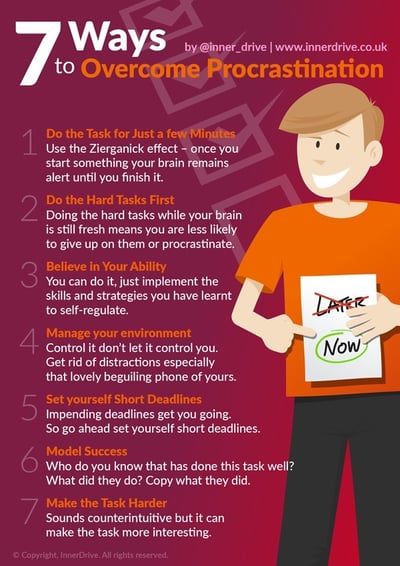Overcoming Procrastination: A Behavioral Coaching Approach
A frequent issue that many individuals face is procrastination. It’s the habit of delaying or putting off tasks and responsibilities. This often leads to missed deadlines, poor performance, and increased stress. If left unchecked, procrastination can have serious consequences on our personal and professional lives. The good news is that there are effective ways to overcome procrastination, and one such approach is behavioral coaching. In this article, we’ll explore the behavioral coaching approach and how it can help individuals overcome procrastination, leading to improved productivity, motivation, and success.
Understanding Procrastination And How To Overcome It
Procrastination is the act of delaying or avoiding a task that needs to be completed. It’s a common behavior that can be caused by a variety of factors. It includes fear of failure, lack of motivation, and poor time management skills. To overcome procrastination, it’s important to first understand its causes and effects. Here are some crucial considerations:
Causes And Triggers
There are several causes of procrastination. Fear of failure, lack of motivation, perfectionism, and poor time management skills are some common causes of procrastination. Triggers such as boredom, stress, and overwhelm can also contribute to procrastination behavior. Understanding these causes and triggers can help individuals identify their own procrastination patterns and develop strategies to overcome them.
Types Of Procrastination
There are different types of procrastination, including chronic procrastination, situational procrastination, and perfectionism-based procrastination. Chronic procrastination is a long-term habit of putting off tasks. Situational procrastination is more situational and happens in response to specific triggers. Perfectionism-based procrastination occurs when individuals delay tasks because they feel they won’t be able to complete them perfectly. Understanding these types of procrastination can help individuals identify which type(s) they tend to engage in and develop appropriate strategies to overcome them.
Consequences
Our personal and professional lives may suffer as a result of procrastination. Missed deadlines, poor performance, and increased stress and anxiety are some of the consequences of procrastination. Understanding these consequences can help individuals recognize the importance of overcoming procrastination and taking action to change their behavior.

Unlocking Productivity: How the Behavioral Coaching Approach Can Help You Overcome Procrastination
The behavioral coaching approach is an effective method for overcoming procrastination. It involves identifying the behaviors that lead to procrastination and developing strategies to change those behaviors. Here are some key factors in the behavioral coaching approach and examples of how they can be used:
Goal-Setting
Setting clear and specific goals can help individuals overcome procrastination by providing direction and motivation. For example, instead of setting a general goal of “studying more,” a specific goal of “studying for one hour every morning before work” can be more effective in motivating action.
Action Planning
Breaking down a larger task into smaller, more manageable steps can help individuals overcome feelings of overwhelm and procrastination. For example, instead of trying to complete a 20-page report all at once, breaking it down into smaller tasks can make the task more manageable and less intimidating. Such as researching and outlining.
Self-Monitoring
Monitoring one’s behavior and progress can help individuals stay on track and identify areas for improvement. For example, using a planner or time-tracking app can help individuals track their progress toward their goals and identify areas where they may be procrastinating.
Accountability
Having someone to hold you accountable for your actions can be a powerful motivator for overcoming procrastination. For example, working with a coach or accountability partner who checks in regularly can help individuals stay on track and motivated.
Positive Reinforcement
Celebrating progress and rewarding oneself for taking action can help reinforce positive behaviors and increase motivation. For example, after completing a difficult task, treating oneself to a favorite activity or snack can be a way to celebrate progress and maintain motivation. Individuals can develop effective strategies to overcome procrastination and increase productivity by using these factors in the behavioral coaching approach.
Unlocking Productivity: How the Behavioral Coaching Approach Can Help You Overcome Procrastination
Now that we understand the key factors in the behavioral coaching approach, let’s explore how to apply these strategies in daily life. Here are some additional factors to consider when using the behavioral coaching approach to overcome procrastination:
Prioritization
Identify the tasks that are most crucial to finish first. For example, if you have multiple projects to work on, prioritize the ones with the closest deadlines or highest importance.
Time Management
Use time-blocking or scheduling techniques to manage your time effectively and ensure you have enough time to complete your tasks. For example, block out specific times of the day to work on certain tasks or set a timer for focused work periods.
Mindfulness
Practice mindfulness techniques, such as meditation or deep breathing, to stay focused and reduce stress and anxiety related to procrastination.
Visualization
Use visualization techniques to imagine yourself completing your tasks and achieving your goals. For example, visualize yourself giving a successful presentation or finishing a challenging project.
Positive Self-Talk
Talk kindly to yourself to increase your motivation and confidence. Say to yourself things like, “I can do this,” or “I’ve beaten procrastination before, I can do it again.” By applying these additional factors along with the original strategies consistently, you can overcome procrastination and increase your productivity. Remember, it takes time and effort to develop new habits and behaviors, so be patient and stay committed to your goals.
Overcoming Obstacles to Procrastination: Strategies for Success
Even with the best intentions and strategies, it’s easy to fall back into old habits and behaviors when it comes to procrastination. Here are some common obstacles to watch out for and strategies to overcome them:
Distractions
One of the most common reasons for procrastination is getting distracted by things like social media, emails, or other tasks. To overcome this, it’s important to identify your biggest distractions and find ways to eliminate or reduce them, such as using productivity apps or setting boundaries around your time. For example, if social media is a distraction, use an app or browser extension to limit your time on those sites.
Perfectionism
Another common obstacle to overcoming procrastination is perfectionism. If you find yourself obsessing over every detail or trying to make everything perfect before you start, it can be difficult to even get started. Instead, try focusing on progress rather than perfection. Then aim to complete small and manageable tasks that move you closer to your goals. For example, instead of trying to write a perfect essay, aim to write a rough draft and then revise it later.
Fear of Failure
Another frequent justification for procrastinating is fear of failure. If you’re afraid of not doing something perfectly, it can be hard to even start. To overcome this, try to reframe failure as an opportunity for growth and learning and focus on the progress you’re making rather than the outcome. For example, instead of seeing failure as a setback, view it as an opportunity to learn and improve.

Overwhelm
Large tasks can feel overwhelming and lead to procrastination. To avoid this, try breaking down your tasks into smaller, more manageable steps. This may increase your sense of control and facilitate starting. For example, if you need to clean your entire house, start with one room at a time.
Lack of Motivation
Finally, if you’re feeling unmotivated, it can be difficult to get started on tasks. To overcome this, try revisiting your goals and finding ways to increase your motivation. This could be by reminding yourself why the goal is important to you or finding someone to provide support and encouragement. For example, remind yourself why you set the goal in the first place or find a friend or mentor who can provide support and encouragement.
Bottom Line
Overcoming procrastination can be challenging, but it’s essential if you want to achieve your goals and live a more productive and fulfilling life. By understanding the root causes of procrastination and using a behavioral coaching approach, you can develop strategies to overcome common obstacles and start taking action toward your goals. Whether it’s breaking down large tasks into smaller steps, setting realistic goals, or finding ways to increase your motivation. There are many strategies to overcome procrastination and start achieving your goals. So, take the first step today and start applying these strategies to your life – you’ll be amazed at how much you can accomplish when you overcome procrastination.




